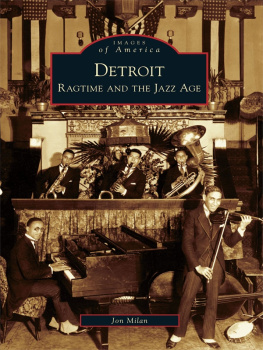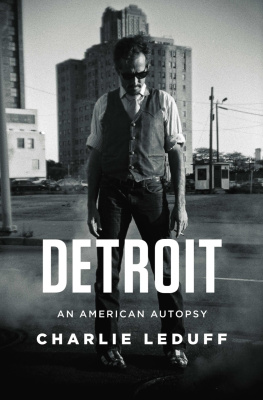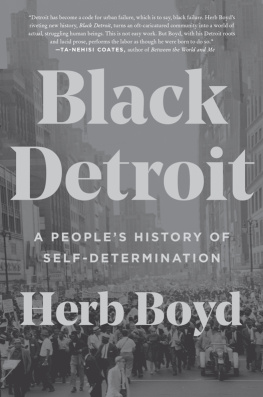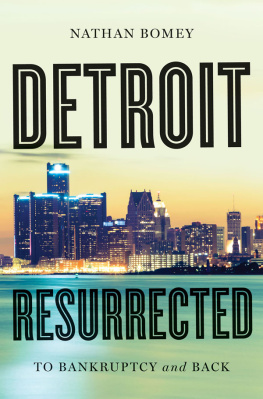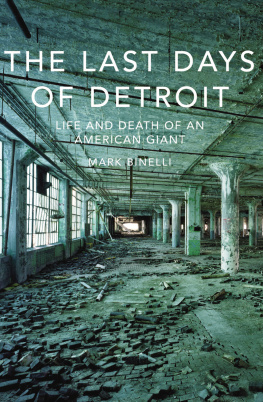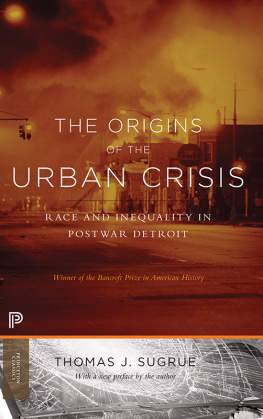2020 by Alesia Montgomery. All rights reserved. No part of this book may be reproduced without formal permission.
ISBN 978-0-8143-4651-8 (paperback)
ISBN 978-0-8143-4650-1 (hardcover)
ISBN 978-0-8143-4652-5 (e-book)
Library of Congress Control Number: 2020933976
Wayne State University Press
Leonard N. Simons Building
4809 Woodward Avenue
Detroit, Michigan 48201-1309
Visit us online at wsupress.wayne.edu
In memory of my parents, Minnie Louise and Carl Lee Montgomery, and their generation of dreamers, strivers, and fighters, to whom we owe everything
First and foremost, I am grateful to Cheryl Danley, Lionel Williams, and Ileana Cortezmy guides into the interior architecture of Detroit. Their research assistance in the early stages of my project made this book possible. Cheryl, a scholar who has worked on health and agriculture issues in the U.S. and South Africa, taught me about the food justice movement in Detroit and introduced me to key players in that movement. She also helped me to do oral histories and to familiarize myself with the streets of Detroit. Many thanks for your help, CherylI enormously benefited from your knowledge and expertise. Lionel and Ileana were my students at MSU, but I was their student in Detroit. Lionel, thank you for your hard work doing interviews and for your insights about Detroits black neighborhoods. Ileana, thank you for gathering interviews and information about immigrant communities and radical movements in Detroit. You bluntly told me that Detroit had been a victim of drive-by research and that I needed to move to the city if I wanted to understand its streets. I am glad that I took your advice and overcame my fear of snowy commutes. Yes, Californians can learn to drive in Michigan winters!
I also am grateful to the Detroit groups who invited me to discuss my research. I shared my preliminary findings at a meeting of the Detroit Food Justice Task Force at Cass Corridor Commons; a gathering of neighborhood groups organized by Building Movement at Central United Methodist Church; a panel at the Peoples Platform Convention at Marygrove College; a meeting of Catholic religious women and mens communities at the Samaritan Center; and a panel at the Arts in a Changing America conference at the Charles H. Wright Museum of African American History. These gatherings gave me encouragement and critique that helped me to push on, revise some of my conclusions, and complete the manuscript.
I appreciate everyone at Wayne State Press who helped me to bring this book into being. I particularly thank Annie Martin, the editor-in-chief who championed my project and gave great advice; Carrie Teefey, the senior production editor who listened to my requests and skillfully moved my project forward; and Dawn Hall, the copy editor whose attention to detail was much appreciated. My thanks also to the anonymous reviewers of the manuscript, who gave me excellent suggestions. I also am indebted to the journal editors and peer reviewers who gave feedback on earlier versions of my work. Some chapters include excerpts of my articles in the International Journal of Urban and Regional Research, Antipode, Ethnography, and the Michigan Quarterly Review.
A special note of thanks to Donna Snowden, who gave permission for me to use art by her sister, the late Gilda Snowden, for the book cover. Born and raised in Detroit, Gilda Snowden was an African American abstract painter whose Flora Urbana series was inspired by the community gardens of Detroit. I became familiar with her work while researching the history of the Corridor; she had been part of the Corridor art scene during the 1970s and 1980s. Snowden served as a professor in the Department of Fine Arts at the College for Creative Studies in Detroit, where she influenced generations of artists. Coincidentally, Tracy Cox, the designer that Wayne State Press hired to craft the cover, was one of her former students. I sought Snowdens art for the cover because her abstraction of gardens, open to multiple interpretations, provokes reflection. I do not seek to have the final word about ecological urbanism. I want Greening the Black Urban Regime to stir thought and debate about the future of cities.
Last but not least, I thank my family: my brothers Ronald, Bucky, and BB; Cousin Patty (the keeper of our family recipes who also serves up food for thought); Mrs. Moore (my mothers best friend and my other mother); the children and partners and buddies and dogs with whom we share our lives; and the spirits of our parents and all the ancestors who warm our hearts. Your brilliance is my North Star.
Table 1. Greening timeline
| Date | Detroit | United States | Global |
|---|
1980s | Gardening Angels transform vacant lots under Mayor Coleman Youngs Farm-A-Lot program | Reagan-Bush years | Landless Workers Movement (MST) founded in Brazil |
Greening of Detroit founded | Whole Foods Market founded | 1987 Brundtland Report warns of climate change |
1990 | Population: 1,027,974(down from 2 million in 1950) |
Marie Farrell-Donaldson, city ombudsman, proposes mothballing high vacancy areas | National People of Color Environmental Leadership Summit writes Principles of Environmental Justice | 1992 UN Earth Summit urges cities to consider threats to ecosystems and vulnerable groups (Rio de Janeiro, Brazil) |
Mayor Coleman Young retires | Congress for New Urbanism advocates mixed use, walkable neighborhoods |
Dennis Archer becomes mayor | Bill Clinton becomes president (1993) |
Midtown Detroit Incorporated (MDI) develops plan to revitalize Eds and Meds hub near downtown | Trend of downtown gentrification in US central cities |
| Date | Detroit | United States | Global |
|---|
2000 | Population: 951,270 | George W. Bush becomes president (2001) | 2002 UN World Summit on Sustainable Development (Johannesburg, South Africa) |
Archer negotiates Compuware move to downtown, agreeing to renovate Campus Martius as anchor for mixed-use enclave | Hurricane Katrina hits New Orleans (2005) | Abahlali baseMjondolo (Shack Dwellers) movement begins in Durban, South Africa |


